- Average Rating:
- Not yet rated
- Topic Areas:
- Master Classes | Hypnosis | Psychotherapy | Ericksonian Hypnosis and Therapy Techniques | Utilization
- Categories:
- Erickson Congress | Erickson Congress 2011
- Faculty:
- Michael Yapko, PhD | Jeffrey Zeig, PhD
- Course Levels:
- Master Degree or Higher in Health-Related Field
- Duration:
- 2:40:43
- Format:
- Audio and Video
- Original Program Date:
- Dec 12, 2011
- Short Description:
- Drs. Yapko and Zeig will engage with each other and the participants to examine commonalities and differences in their work. The Master Class centers on providing then deconstructing demonstrations of Ericksonian Psychotherapy and Hypnosis, providing a unique opportunity for in-depth learning.
- Price:
- $29.00 - Base Price
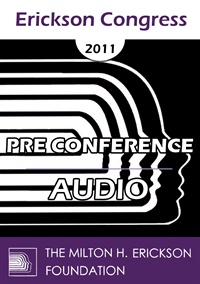
- Average Rating:
- Not yet rated
- Topic Areas:
- Hypnosis | Pre-Conference Sessions | Ericksonian Hypnosis and Therapy Techniques | Fundamentals of Hypnosis | Hypnotic Induction
- Categories:
- Erickson Congress | Erickson Congress 2011
- Faculty:
- Brent Geary, PhD
- Duration:
- 2:42:35
- Format:
- Audio Only
- Original Program Date:
- Dec 08, 2011
- Short Description:
- Designed for participants with little or no previous exposure to Ericksonian hypnosis and psychotherapy, the course will familiarize attendees with essential tenets, terms, and principles of the approach. Topics covered include a historical perspective of Erickson’s work, important pre-hypnotic treatment considerations, and discussion of the typical course of a hypnotic session.
- Price:
- $15.00 - Base Price
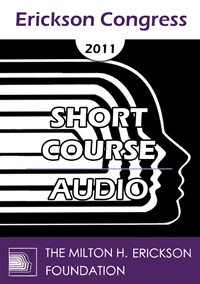
- Average Rating:
- Not yet rated
- Topic Areas:
- Short Courses | Hypnosis | Self-Hypnosis | Utilization
- Categories:
- Erickson Congress | Erickson Congress 2011
- Faculty:
- Nicole Ruysschaert, MD Psychiatrist
- Duration:
- 1:25:38
- Format:
- Audio Only
- Original Program Date:
- Dec 09, 2011
- Short Description:
- In this workshop, we will adopt a positive approach and focus on aspects that are part of the FLOURISH model: Flow, Utilization, Resilience, Imagery to stimulate high levels of pleasure and satisfaction. These aspects can be developed with self-hypnosis exercises. Neurobiological aspects will be reviewed and impact of the flourish model on development. In practical exercises you can discover how to work out your own “petals of satisfaction.”
- Price:
- $15.00 - Base Price
Tags: Hypnosis Self-Hypnosis Utilization
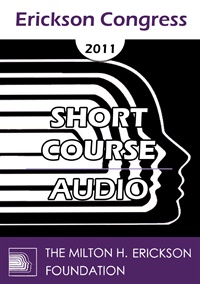
- Average Rating:
- Not yet rated
- Topic Areas:
- Hypnosis | Short Courses | Strategic Therapy | Meditation, Spirituality and Yoga | Consciousness | Trance
- Categories:
- Erickson Congress | Erickson Congress 2011
- Faculty:
- Donald Miretsky, M.Ed
- Duration:
- 1:16:16
- Format:
- Audio Only
- Original Program Date:
- Dec 09, 2011
- Short Description:
- Experience video and didactic presentations comparing strikingly similar methods between eastern spirituality and Ericksonian approaches. Advaita teaches self-inquiry for recognition of that which is al-ready present as Ericksonian thinkers teach unconscious exploration for resources already attained. Learn the core concepts of each and how their integration can enhance therapist effectiveness, and create the space needed for personal development, wellness, and enrichment. Demonstration.
- Price:
- $15.00 - Base Price
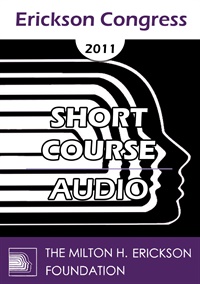
- Average Rating:
- Not yet rated
- Topic Areas:
- Hypnosis | Short Courses | Supervision | Utilization
- Categories:
- Erickson Congress | Erickson Congress 2011
- Faculty:
- Dale Bertram, PhD | Mike Rankin, MA | Mike Rankin, LMFT
- Duration:
- 1:29:08
- Format:
- Audio Only
- Original Program Date:
- Dec 09, 2011
- Short Description:
- By utilizing hypnosis in supervision, supervisors can help supervisees tap into their resources and grow in confidence as therapists. This process of utilizing hypnosis in supervision can be a useful method to meet the standards for achieving the results that supervisors, supervisees, and clients seek. This process can be a very effective method in achieving coherence, strengthening the ability to be accountable, while helping form a clear map for directing supervision.
- Price:
- $15.00 - Base Price
Tags: Hypnosis Supervision Utilization
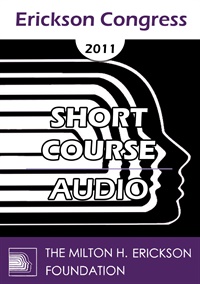
- Average Rating:
- Not yet rated
- Topic Areas:
- Short Courses | Goals of the Therapist | Hypnosis | Post-Hypnotic Suggestion | Suggestion
- Categories:
- Erickson Congress | Erickson Congress 2011
- Faculty:
- Jose Cava Roda, Lic. Psychologist | José Cava, Lic Psychologist
- Duration:
- 1:34:42
- Format:
- Audio Only
- Original Program Date:
- Dec 09, 2011
- Short Description:
- The probability that posthypnotic suggestions will be carried out is highly increased by associating them to the client’s daily life events or activities with an analogical or metaphorical relationship to the therapeutic goals. These life events or activities work as a frequently available signal that facilitates the in-tended behavior or response.
- Price:
- $15.00 - Base Price
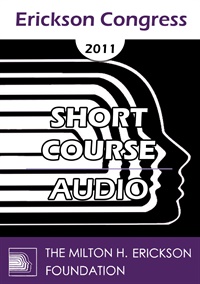
- Average Rating:
- Not yet rated
- Topic Areas:
- Short Courses | Hypnosis | Meditation, Spirituality and Yoga
- Categories:
- Erickson Congress | Erickson Congress 2011
- Faculty:
- Judith Swack, PhD
- Duration:
- 1:29:47
- Format:
- Audio Only
- Original Program Date:
- Dec 09, 2011
- Short Description:
- Many clients seek therapy in a spiritual crisis. Some feel that life has no meaning or is punishment requiring redemption. In this seminar, the presenter will describe original research on the patterns that cause these misconceptions and lead participants in a guided meditation back in time to the formation of their souls. There they will attend an orientation seminar to review their soul contracts and prepare for a satisfying life in the dualistic universe.
- Price:
- $15.00 - Base Price
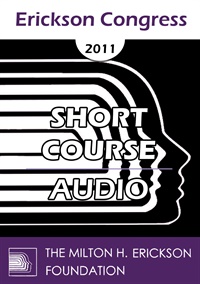
- Average Rating:
- Not yet rated
- Topic Areas:
- Short Courses | Ericksonian Hypnosis and Therapy Techniques | Hypnosis | Multicultural
- Categories:
- Erickson Congress | Erickson Congress 2011
- Faculty:
- Timothy Thomason, MA, EdD
- Duration:
- 1:13:38
- Format:
- Audio Only
- Original Program Date:
- Dec 09, 2011
- Short Description:
- Milton Erickson studied Native American healing practices and incorporated some of what he learned into his own approach to hypnosis. In this presentation principles and practices of Native American healing that parallel hypnosis will be described, and contribution to Erickson’s approach will be identified.
- Price:
- $15.00 - Base Price
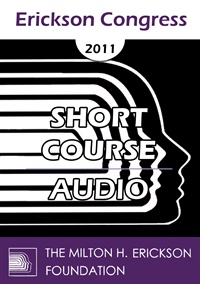
- Average Rating:
- Not yet rated
- Topic Areas:
- Short Courses | Hypnosis | Brief Therapy | Hypnotherapy | Anxiety | Cognitive Behavior Therapy (CBT) | Depression
- Categories:
- Erickson Congress | Erickson Congress 2011
- Faculty:
- Assen Alladin, PhD
- Duration:
- 1:32:25
- Format:
- Audio Only
- Original Program Date:
- Dec 09, 2011
- Short Description:
- There is growing evidence for an additive effect when hypnosis is combined with brief therapies in the management of various emotional disorders. This workshop will describe Cognitive Hypnotherapy, an innovative integrated approach to brief psychotherapy that systematically combines hypnotic techniques with CBT in the management of various emotional disorders to enhance treatment outcome and prevent relapse. This course will be invaluable to therapists who wish to broaden their skills in the management of emotional disorders.
- Price:
- $15.00 - Base Price
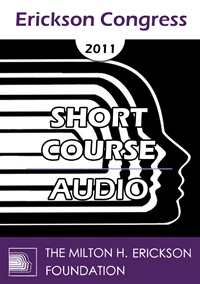
- Average Rating:
- Not yet rated
- Topic Areas:
- Short Courses | Pain and Healing | Hypnosis | Strategic Therapy
- Categories:
- Erickson Congress | Erickson Congress 2011
- Faculty:
- Deborah Beckman
- Duration:
- 1:19:10
- Format:
- Audio Only
- Original Program Date:
- Dec 09, 2011
- Short Description:
- Clients in pain yearn for sleep; comfort just out of reach. Focus first on establishing soothing sleep and encouraging nocturnal restorative functions. Treating remaining pain stays in the day’s domain. Hypnosis enlists the mind and body’s natural processes, restoring healthy sleep. Strategic protocols combine physiology of sleep and pain management with the client’s own experience. These are further reinforced by self-hypnosis techniques. Program includes demonstration, application of trance script protocols, and case study discussion.
- Price:
- $15.00 - Base Price
Please wait ...


